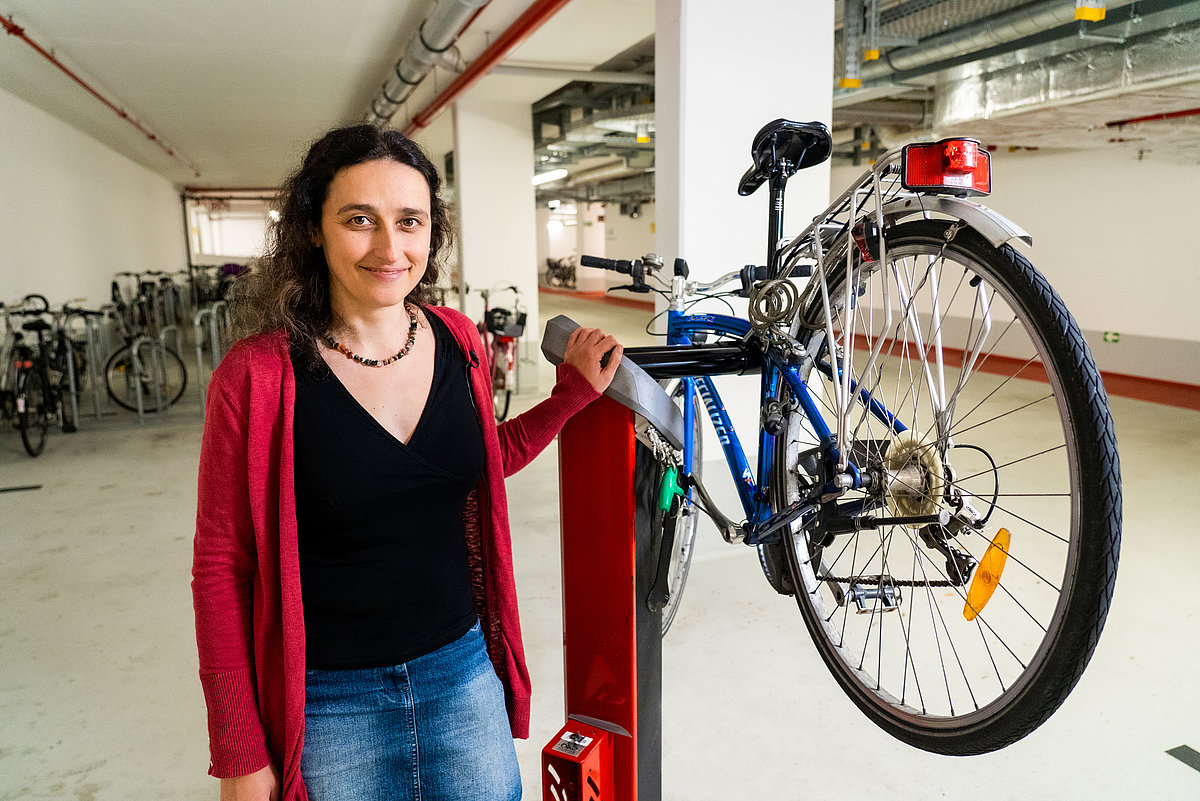Mobility is becoming more eco-friendly
GIZ has set itself the goal of improving its ecological balance as one of the three dimensions of sustainability. Reducing greenhouse gas emissions by changing our behaviour with regard to commuting and business trips makes an important contribution to this.
2020 mobility survey in Germany
To enable us to make decisions on the basis of sound data, GIZ conducted a mobility survey among staff at its Berlin, Bonn and Eschborn offices in 2020. The aim was to build a database to calculate the emissions generated during journeys to work up to 2020. We also wanted to gain a picture of the impact of the COVID-19 pandemic on mobility and mobility habits, thereby enabling us to better plan infrastructure at our different sites – bike racks and charging points for electric cars, for example.
One of the key findings was that greenhouse gas emissions from commuting by GIZ staff in Germany were 13 per cent lower in 2019 than in 2018 – although the workforce expanded. This was primarily a result of remote working, for which standard arrangements were put in place in the Employer/Staff Council Agreement on Flexibilisation of Working Hours and Locations in January 2019, i.e. before the pandemic hit. The calculations took into account carbon dioxide equivalent (CO2e), nitrogen oxides (NOx), sulphur dioxide (SO2) and particulate matter (PM10).
As expected, the COVID-19 pandemic accelerated the trend towards remote working. While employees previously worked one day a week from home on average, this has increased to four days a week since the start of the pandemic.
Cycling to work instead of driving also cuts emissions, and GIZ encourages its staff to make this switch. The German Environmental Management Association (B.A.U.M.) has certified that GIZ is bicycle-fit, with two sites joining the list in 2020. Certification had already been granted to the Bonn site on Friedrich-Ebert-Allee in 2012 and 2018. The buildings on Kottenforst Campus in Bonn-Röttgen and the Bonn Campus that were completed in 2018 were then certified in 2020. GIZ also supports the use of public transport with schemes such as the ‘Jobticket’, whereby it pays for season tickets for commutes to work in Bonn and Eschborn.

(© GIZ / Deniss Kacs)
In figures
GIZ carried out a survey of staff at three sites in Germany, asking them about their mobility habits. The 2020 survey produced the following results:
The need to travel
GIZ has worldwide operations, and as such our global networks, access to partner organisations, the diversity and skills of our staff around the globe and our presence on the ground in partner countries are vitally important to us. This means that travel is a key factor in our service delivery. It unfortunately also means that travel is the single largest source of GIZ’s greenhouse gas emissions – in fact over 75 per cent of emissions in 2019. And that in turn means that travel offers the greatest leverage for reducing our emissions. This is why we have drawn up a system that will help to determine from now on whether a trip is really necessary.
The country offices – an example from Namibia
The country offices use the Corporate Sustainability Handprint® (CSH) to report how they have reduced their environmental footprint, and they continue to come up with new initiatives in this area. The country office in Namibia, for example, conducted a nationwide survey of its staff to identify environmental sustainability potential during the COVID-19 pandemic. It included a question about the extent to which staff in the individual projects have an opportunity to reduce their air travel in connection with the project in the coming years. A six per cent average reduction was calculated from the responses. This figure is now the target for lowering greenhouse gas emissions from air travel.
Electric mobility
We have set ourselves the goal of reducing our fleet of company vehicles inside and outside Germany, and switching to more climate-friendly vehicles where possible. In response to the rising number of electric vehicles and of course to promote sustainable mobility, charging points are available at our German offices in Bonn and Eschborn, at Kottenforst Campus and in Feldafing. Staff can use them free of charge during working hours.
Electric mobility
| Gross volume of other indirect GHG emissions (t CO2e) | 23,275 (business trips) 3,042 (commuting in Germany) |
| Categories and activities relating to other indirect GHG emissions (Scope 3) included in the calculation | Business trips, commuting in Germany |
| Baseline year | 2019, the last full reporting year prior to the COVID-19 pandemic |
Information on the following Sustainable Development Goals (SDGs) can be found on this page:
